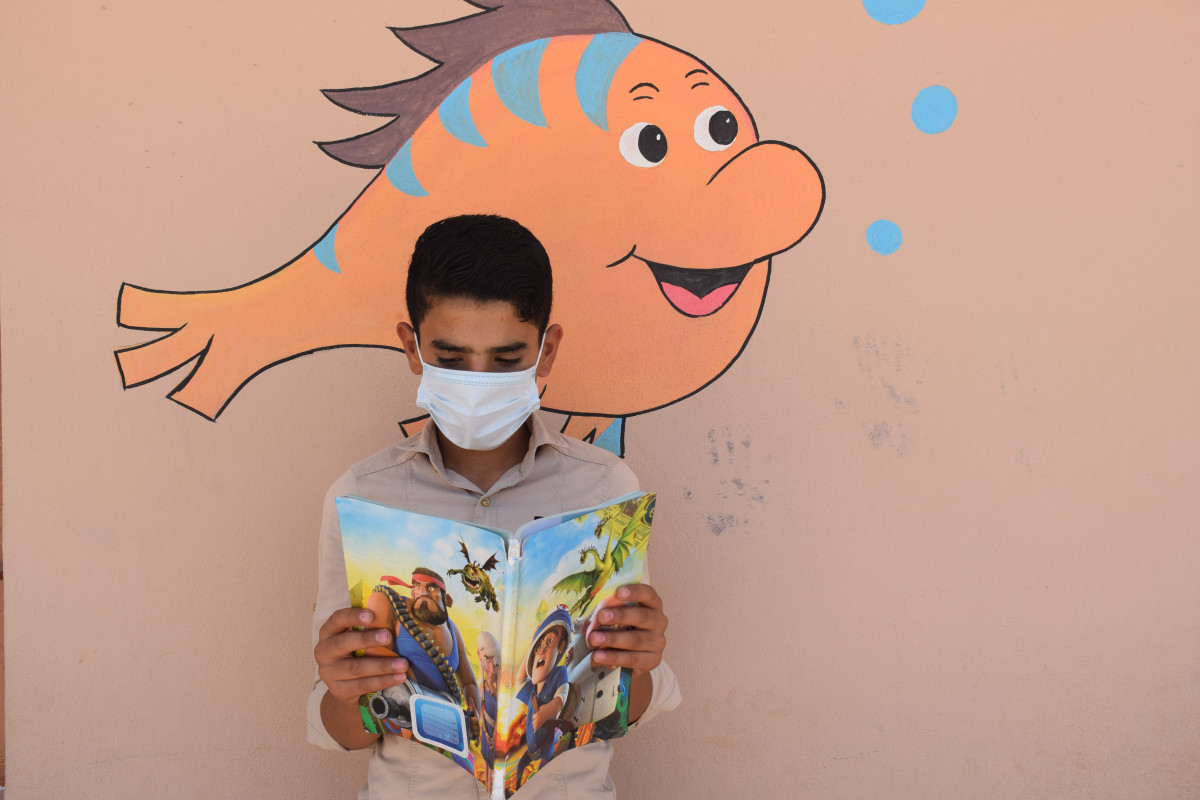Children in Iraq adapt to distant learning
Published: Sep 4, 2020 Reading time: 5 minutes Share: Share an articleDuring years of political strife and conflict, consistent access to quality education was already difficult for children living in northern Iraq. Now, as the world grapples with the growing COVID-19 pandemic and closures of businesses and institutions, Iraqi children face a new obstacle to their development.

With schools closed since February and stay-at-home guidance in place, PIN worked with communities in the Nineveh, Kirkuk, and Salah Al Din governorates to find a solution for thousands of children whose education was put on pause.
“Distant learning allows students to continue learning and helps them stay focused on education,” says Abdul, 28-year-old educator at a boys school in Nineveh. He explained how often, “when students stop going to school for a period of time they get used to it and don’t like to go back to learning later.”
PIN helped facilitate the transition from traditional classroom learning to distant, at-home, learning. Educators like Abdul received training on how to implement lessons online, via photos and videos sent through messaging applications. Children can now access lessons through a family-member’s smartphone and even gain closer access to their teachers with the ability to ask them questions at their leisure.
“In school, the class is full of students, and I can’t ask the teacher a lot of questions,” says Shahad, 13, in 6th grade. “But now, I can ask him a few times throughout the online class.” Shahad is happy to be able to continue her education at home, and even finds some benefits to distant learning. She has four classes each week, one in math, science, English and Arabic, and always has plenty of questions to ask as she pushes herself to really understand each one.
A nice quiet space in the hallway
Shahad finds a nice quiet space in the hallway of her home to do her lessons, and her family supports her in her education – her parents were even able to buy her a mobile phone so she can have constant access to her learning. “It’s a great feeling to see your child learn near you and give them help and encouragement,” Shahad’s mother expressed.
If her children didn’t have these daily lessons and activities, Shahad’s mother explained, they would most likely just play with each other or help her with the housework. “I see that they are constantly evolving by following their daily lessons,” she said gratefully.
Apart from normal school lessons, PIN distant learning also offers activities surrounding psycho-social support. When the lockdown period and school closures began, Ghofran, 11, spent most of her time drawing or watching cartoons. But she found herself feeling nervous, not knowing what was going to happen with the spread of COVID-19 and what it would mean for her and her family.
When the distant learning activities started, she found it difficult to even focus on her assignments or read on her own. But after initial adjustments – and help from her parents – she soon found a rhythm in her studying. "It gave me the opportunity to learn and have fun during curfew," says Ghofran. "I became less nervous after joining the remote learning activities also because I get to talk to my friends daily and my teachers as well."
“When the school and activities stopped I was very sad and disappointed,” Ghofran expressed from her home in village in Nineveh. She described how she was bored at home just watching cartoons and playing with her little sister. “I was very excited to go back to learning,” she says of PIN supported distant learning classes.
The opportunity to engage in meaningful work during such a precarious time proved beneficial even for educators. “It was a very critical time when PIN resumed the activities for me personally,” Abdul expressed. “I felt pressure and distress because of all the news on COVID-19 and the number of infected people and the death rates so I needed something to get busy with, and this opportunity was perfect.”
There was a learning curve, of course, at the beginning. Not every family knew how to use the mobile applications necessary for the classes or had strong enough internet access, so PIN-trained facilitators were provided with internet access and went to homes to support families in learning the new process. Class attendance was initially low. But Abdul noted, to his surprise, the rapid growth of students attending his classes after the first few weeks as children started telling their friends about the opportunity.
The passion of reading
Rakan, 12, thought he needed a break from school at first, so he enjoyed having more time playing football, gardening with his father and spending time on one of his passions: reading. He participated in PIN psycho-social support after school activities in the past, so he was excited once he learned he could do the same at home. “When I heard about it, the news made me happy,” he says, ecstatic. “I had good times in the activities and I really enjoyed all my time with my friends and teachers after school.”
“I like trying out new things and know more about latest technologies and practices,” Rakan continues, adding how he has dreams of being an engineer. “I was able to be a part of a new experience here in my country which made me happy.”
Although teachers and students alike all hope to return to face-to-face classes soon, the experience of distant learning has been invaluable and ensures no learning was lost once schools reopen. Together, with funds by Iraq Humanitarian Fund managed by the United Nations Office for the Coordination of Humanitarian Affairs (OCHA), and in partnership with Malteser International with the funds of the German Federal Ministry for Economic Cooperation and Development (BMZ), PIN brought distant learning opportunities to 36 schools in 28 communities, impacting 14,062 children.









